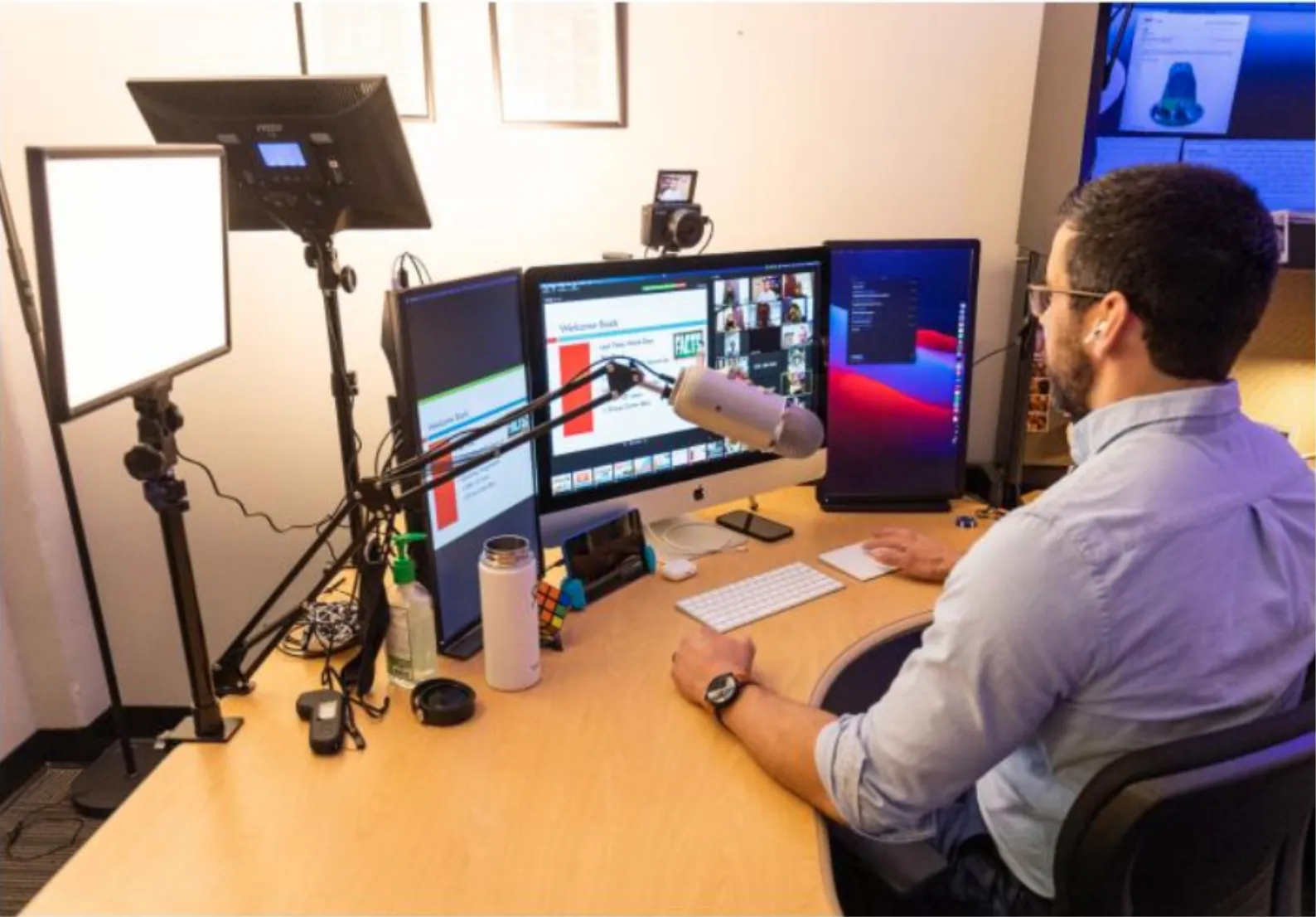February 25, 2022
School of Information Science Gives High Schoolers a Head Start

SIS senior lecturer Joe Martin prepares to teach his CIS 110 dual credit course, which allows Kentucky high school students in the UK Next Generation Scholars program to earn college credits while still in high school.
In an aim to help bridge the gap between Kentucky high school instruction and college readiness, two School of Information Science faculty members are lending their expertise to the University of Kentucky Next Generation Dual Credit Network.
For the 2020-2021 school year, SIS Senior Lecturer Joe Martin taught two of three College of Communication and Information dual credit courses: Composition and Communication 1 and 2 (CIS 110 and 111), respectively. In Spring 2021, Troy Cooper, assistant professor and director of undergraduate studies for the School, taught the third CI course: Informational Literacy and Critical Thinking (ICT 200).
“We try to emulate the college classroom as best as possible,” Cooper said. “We’re trying to give the high school students a taste of what college would be like.”
In early 2020, the UK Center for Next Generation Leadership in the College of Education started its dual credit program for select Kentucky high schools participating in the UK Next Generation Leadership Academy. While the Spring 2020 semester saw four pilot schools in the program, the Fall 2021 semester has a total of 14 schools from around the state.
The dual credit program allows high school juniors and seniors, called UK Next Generation Scholars, to take UK courses. Many of the courses fulfill UK Core requirements and all are taught by UK instructors via interactive video. Not only does this allow students to earn high school and college credit simultaneously, but it also gives them the experience of a UK classroom. High school teachers partner with the UK instructors for the courses, allowing them to learn how to better transition their students from secondary to higher education.
Martin finds the mission of the dual credit program compelling because it reaches communities who are underserved by higher education. For the past two semesters, he worked with Paris High School and Somerset High School. Though he has taught CIS 110 and 111 for seven years, this was his first time teaching high schoolers and collaborating with high school teachers.
“One of the cool things about these students is that they’re with their peers, many of whom they’ve known for several years, and so it’s a very different dynamic versus a college classroom of first-years where many of them aren’t even talking to each other,” Martin said. “In these cases, they’re at ease because, even though they’re taking a college class with an instructor, they know their high school teacher, they know their friends, and I think that creates a nice comfort level for them.”
Cooper synchronously taught 10 students from Marshall County High School and Fleming County High School in Spring 2021. Though teaching high schoolers off-campus is a “different animal” from teaching college students on-campus, he said the academic performance was similar. In fact, he said some of the high school assignments submitted were better than the general freshman submissions.
Despite conflicts with differing school schedules, COVID-19 responses and socioeconomic factors that have made the dual-credit program a bit challenging at times, they have not dampened the effectiveness of the program and its impact.
Amy Mason, an English teacher from Paris High School, had one of the biggest sections for the CIS course with 26 students in Fall 2020 and 24 students in Spring 2021. She believes that while this experience was an “eye opener” for many of her students, they have adapted well thanks to Martin, who she says went above and beyond. The experience went so well that she hopes to co-teach with him again in the future.
Brian Blankenship, headmaster and English teacher of the Carnegie Academy at Somerset High School, also worked with Mason and Martin.
“Our students were very excited to be able to take dual credit from the flagship university in our state,” Blankenship said. “The participation speaks for itself. Roughly 8 percent of our students are taking classes via UK, and this is during a pandemic and multiple school models. In south central Kentucky, many students do not have access to large universities, especially one that is so supported by our citizens. UK Next Gen provides hope and opportunity to students and parents who dream for more.”
Blankenship’s student Lucy McArthur said taking college-level communication courses has not been easy, but it has been rewarding.
“I am now fully confident that I want to attend college and continue on my path of writing and speaking,” McArthur said. “Thanks to the patient, helpful and thoughtful education from my instructors, UK’s high academic standards and the many life lessons and values I was taught along the way through this dual credit course, I can say with certainty that I have grown on my academic path to college.”
While one of Martin’s main goals is to give his students a good impression of UK, he hopes that the connections he has built with his students help them realize their potential.
“There’s a certain group of students who probably the main thing they’ll get out of this is college credit,” Martin said. “But I think there’s another group of students who probably the most significant thing they’ll get out of it is just a perception that college is attainable for them — cognitively, mentally, academically — and that’s a really valuable thing. I think that’s kind of the driving force behind this, to say, ‘You can do college. This is your chance to give it a try and hopefully realize you can.’”